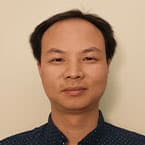The Bosarge Family Foundation-Waun Ki Hong Scholar Award for Regenerative Cancer Medicine
The Bosarge Family Foundation-Waun Ki Hong Scholar Award for Regenerative Cancer Medicine represents a joint effort to encourage and support postdoctoral or clinical research fellows to conduct highly novel and provocative research in the field of regenerative cancer medicine and to establish a successful career path in this field. Funded research is directly related to the enhancement of the physiology of cancer survivors.
2023 grantee

Research
Cancer survivors often endure lifelong dry mouth post radiotherapy, due to ultra-high radiosensitivity and limited regenerative capacity of salivary glands. To address this major clinical challenge, Dr. Gan has developed a murine salivary gland transduction system involving in-utero injection of lentiviral pools containing barcodes and/or gene targeting constructs. This system allows for high fidelity lineage tracing and pathway perturbation and enables the identification of crucial cell populations contributing to salivary gland regeneration post-irradiation. Dr. Gan will functionally dissect the barriers impeding salivary gland regeneration by perturbing differentially regulated molecular pathways post-irradiation. He hypothesizes that the combinatorial removal of several regeneration barriers will lead to comprehensive salivary gland regeneration post-irradiation.
Biography
Dr. Gan earned his doctorate in cell biology from the Institute of Genetics and Developmental Biology, Chinese Academy of Sciences. Following brief postdoctoral training in stem cell and cancer initiation at Columbia University, he is currently engaged in postdoctoral research focused on salivary gland regeneration at the Icahn School of Medicine at Mount Sinai.
Acknowledgment of Support
“The 2023 Bosarge Family Foundation-Waun Ki Hong Scholar Award for Regenerative Cancer Medicine is crucial to me as a postdoctoral fellow aspiring to become an independent scientist focusing on glandular epithelial regeneration post cancer radiotherapy. This prestigious award provides critical support and vital resources to establish my own research program.”